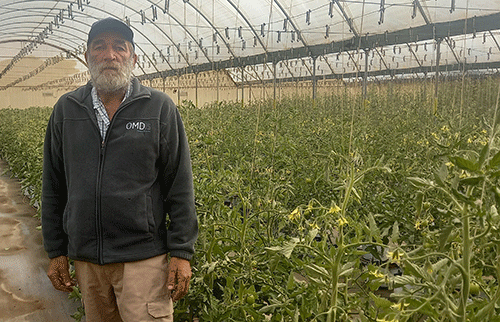ORANJEMUND – The OMDis nursery project outside Oranjemund has the potential to soon become the sole provider of vegetables to residents as far as nearby Rosh Pinah in southern Namibia.
OMDis Town Transform Agency is a Section 21 Company or Special Purpose Vehicle with the sole purpose to proactively accelerate town transformation – the economic diversification of Oranjemund – to ensure the town’s sustainability by 2030 and beyond.
Nursery manager Ettienne de Jagger said they started the project by growing carrots six years ago and have since planted and harvested 1 247 tonnes of green peppers and 5 497 tonnes of cauliflower.
“In addition, we are growing cucumbers, cabbage, onions, beans, strawberries and different kinds of chilies which we are primarily selling to Welwitchia Catering Company, who are feeding Namdeb employees at smaller mines as well as small-scale informal traders in town.”
Another product is Cassava roots which they supply to a woman in Windhoek who grinds it into low GI-containing (gluten-free) maize meal as these are no longer available in neighbouring Angola.
They sell directly to the public once a month during open market days.
“OMDis, as part of its corporate social responsibility, initiated and trained teachers and learners of the local Ambrosius Amutenya Primary School, and the vegetables harvested are contributed to the school’s feeding project for vulnerable children,” he said.
De Jagger added that they are currently growing some vegetables under hydroponic tunnels, but need to install climate-control ones to counter bad weather conditions like severe cold, hail, rains and strong wind which are not suitable for growing crops.
“We are buying water and electricity from Oranjemund Town Council, but just need to repair our borehole at the nursery as an operational saving mechanism,” he said.
De Jagger said once allocated more land by the Oranjemund Town Council, the project can expand to also sell vegetables to local hawkers who can resell them to the public at an affordable price and also make a profit in the process.
“The idea is to commercialise the project at the end, selling our produce directly to the less-fortunate residents in the town and surroundings from a tuck shop,” noted.
The garden was started by the then Consolidated Diamond Mines (CDM) in 1956 to produce vegetables for the hostel kitchens on the mining site where lower-grade employees used to stay.
OMDis took over the project seven years ago and production has expanded tremendously since then.



